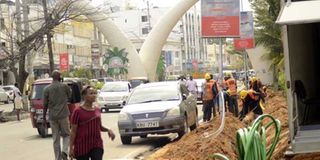Telecoms and road chiefs hold talks to end cable damage

A data cable is installed along Moi Avenue in Mombasa on March 14, 2014. PHOTO | KEVIN ODIT | FILE
What you need to know:
- Telecoms Service Providers Association of Kenya chief executive Fiona Songa said the industry would supply KeNHA with the standards of ducts to be installed in new road projects
- Ms Susan Mocheche of the Communications Commission of Kenya said that the regulator will focus on enforcing infrastructure sharing among firms
The national road maker has offered to build ducts for telecom infrastructure countrywide.
This follows talks telecom firms have started with the Kenya National Highways Authority (KeNHA) aimed at eliminating service interruption due to fibre cuts during road construction.
As a result of the talks, KeNHA engineer John Ottati has said: “If we get your requirements at the planning stage, the ducts will be provided at the time the road is being built at our cost but later than that the players will bear the cost.”
Mr Ottati spoke at the just concluded Connected Kenya Summit in Kwale.
For the existing infrastructure, he said, there is need to synergise the telecom companies’ work with road construction authorities to avoid service interruption.
“When you identify the route where you are laying your cables, we are now requiring you to furnish us with “as built” drawings showing exactly where they pass and at what depth. This will help us reduce interference,” Mr Ottati noted.
Telecoms Service Providers Association of Kenya chief executive Fiona Songa said the industry would supply KeNHA with the standards of ducts to be installed in new road projects.
“We do have the standards of a duct that would carry more than the current providers but we have not been able to get through to you. We will get this to you as soon as possible,” Ms Songa said during a session on how best to implement the country’s recently launched broadband strategy that envisions connectivity of every Kenyan household by 2017.
“We have our fibre cables running along the roads and both the operators and the road construction authorities know. We have had a lot of difficulties and lost a lot of money repairing vandalised cables,” an engineer with Telkom Kenya, Mr Andrew Kimosi said.
“What we are requesting is to be allowed to relocate our infrastructure during construction just the way the contractors provide an alternative road for use while setting up a new one,” Mr Kimosi added.
SHARING SPECTRUM
Liquid Telcom CEO Ben Roberts said the industry does not have full information of planned projects, making it hard to provide road construction authorities with the planned designs of telecommunication infrastructure for the routes.
“The issue we have is how we know what projects are being planned on time to engage with you for planning,” Mr Roberts said.
Ms Susan Mocheche, who represented Communications Commission of Kenya director-general Francis Wangusi at the forum, said that the regulator will focus on enforcing infrastructure sharing among firms.
“We have prepared new guidelines on spectrum and infrastructure sharing that we hope will improve competition by giving all players, big or small, a chance,” she said.




